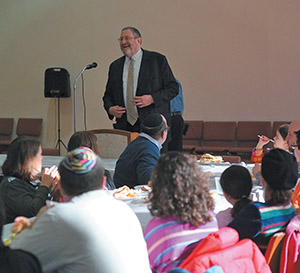

Livingston—The power of prayer was the focus of a talk on February 15, given by Jewish radio personality Nachum Segal at the Suburban Torah Center in Livingston, N.J. More than 60 people, including a number of individuals from nearby West Orange, attended the breakfast event.
Titled. “So When Does He Daven? Nachum Segal on Prayer, Priorities and People,” the radio host focused on the importance of prayer in a person’s life.
Noting that he is up by 4:30 each day to prep for his radio program, JM in the AM, that airs locally from 6 a.m.-9 a.m. on 91.1 WFMU, Segal said he understands how hard it is to find the time to pray. For him, the specific challenge is finding time to say the Shacharit morning prayers. It’s a challenge that has been with him since he began his radio show more than 30 years ago. It’s also an issue that has sparked curiosity from his radio audience as the No. 1 question he is asked is, “When do you daven?”
The answer, he said, isn’t a simple one.
“Either before, during or after the show,” he told his audience. He went on to explain that it really depends on his day, and that it takes a great deal of discipline to ensure that he prays in the morning, as sometimes—especially if he waits until after the radio program is over—the day can easily get away from him.
Rabbi Elie Mischel of Suburban Torah said this is part of the reason why Segal was a particularly good person to speak at the shul on the importance of prayer. “We all struggle with making time to pray, and hearing from someone like Segal, who is not a rabbi, and who has to work tremendously hard to make it a point to daven, is particularly inspiring for all of us.”
For his part, Segal believes that the type of radio program he hosts—his show plays Jewish music and provides Jewish news and information—helps people, including himself, think more about prayer.
“Jewish music is somewhat like a prayer,” the radio host said, noting that “we open the show every morning with ‘Modeh Ani,’ and many other songs contain the words of Jewish prayers.” That, he suggested, “helps people be inspired to be closer to God.”
The connection between Jewish songs and prayers go beyond simple song lyrics as the gematria, numerical values, of the Hebrew words “tefillah” (prayer) and “shira” (song) are nearly identical. But playing music alone, Segal insists, does not compensate for prayer.
Segal, who also serves as a cantor on the High Holidays at a synagogue on Staten Island, went on to say that if someone feels removed from prayer because he or she doesn’t understand the tefillot, s/he should pick one prayer or passage and learn the meaning and context of it, “and make it your own.”
“Use just a few lines to establish a connection to the one above,” he suggested.
Segal went on to say that, “We have an opportunity to get closer to God every day of the year. … Men and women, every one of us, has the opportunity to increase our prayer and affect change.”
“Prayer is such an important aspect of our tradition,” he added. “If everyone can go ahead and incorporate more davening, I believe everyone’s life will be enhanced.”
By Faygie Levy











